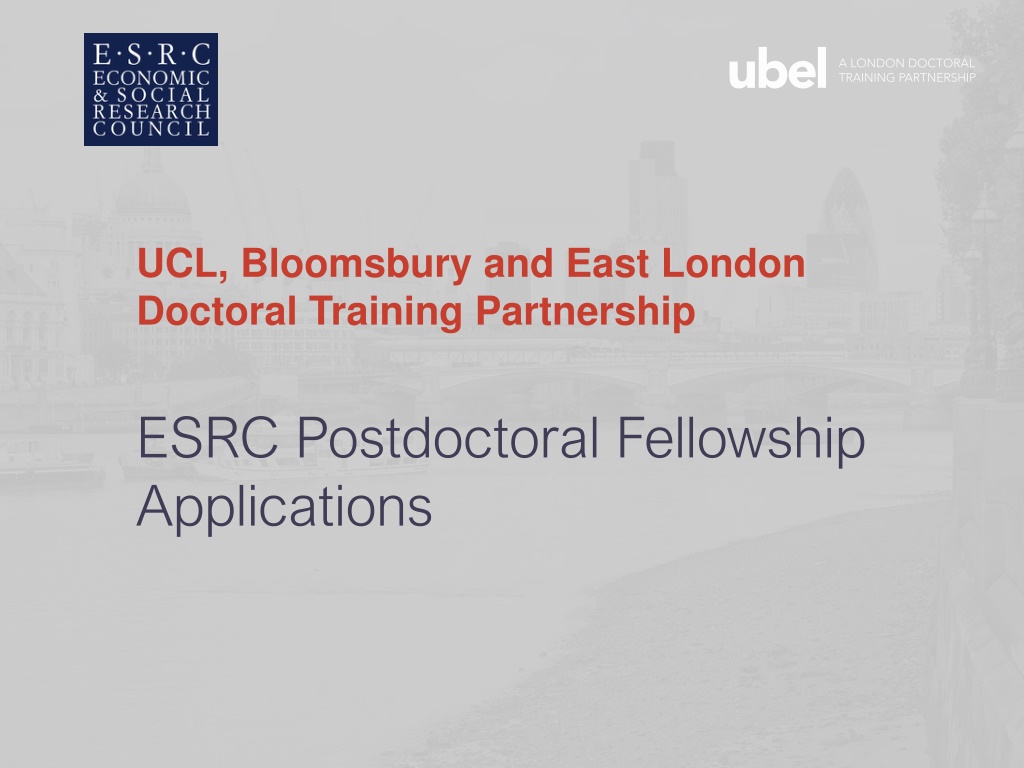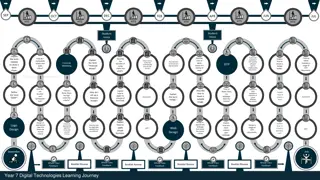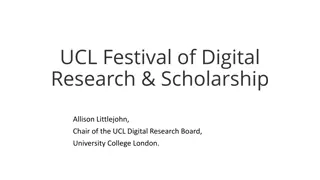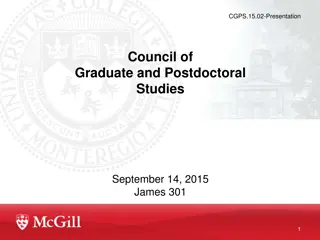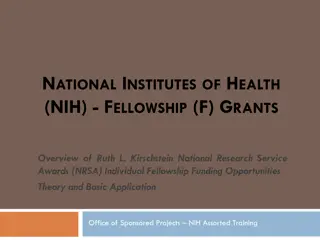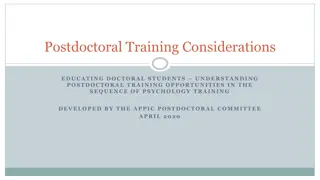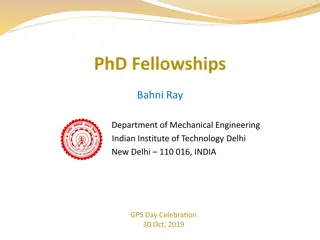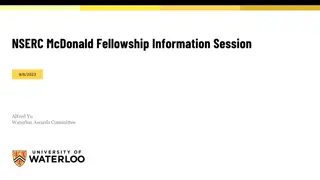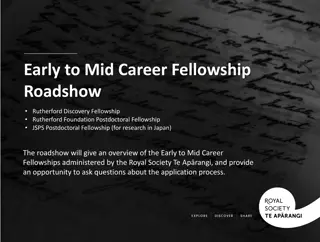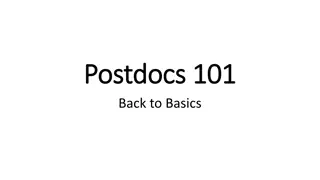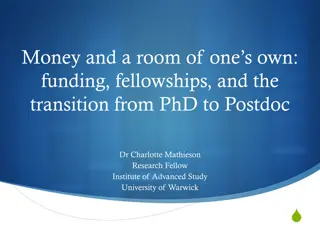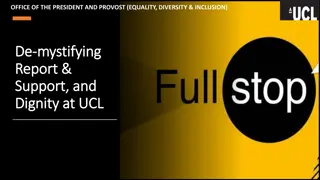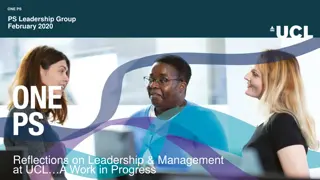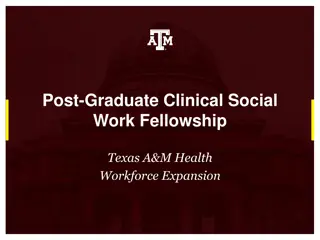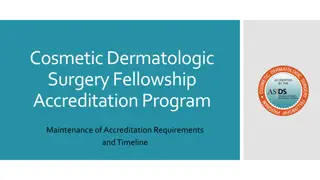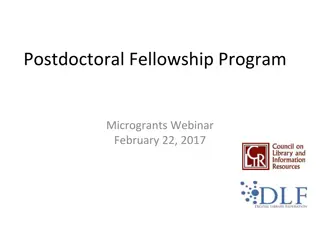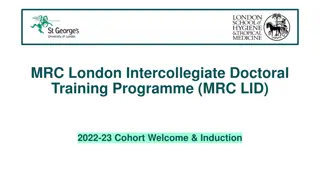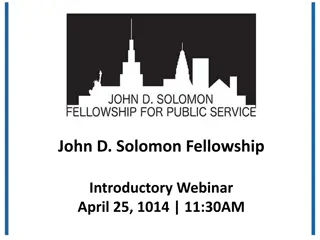ESRC Postdoctoral Fellowship Opportunities at UCL, Bloomsbury, and East London DTP
The ESRC Postdoctoral Fellowship scheme offers a bridge between PhD and early career research, supporting development beyond a doctoral level. The UBEL DTP, one of 14 ESRC DTPs, provides ample opportunities for interdisciplinary social science research with collaboration across five universities. Eligible candidates can apply to work on research projects aligning with various overarching groupings and pathways. Applications for the fellowship involve specific eligibility criteria, such as having less than one year of active postdoctoral experience and identifying a mentor. Key dates for application submission are outlined on the UBEL DTP website.
Download Presentation

Please find below an Image/Link to download the presentation.
The content on the website is provided AS IS for your information and personal use only. It may not be sold, licensed, or shared on other websites without obtaining consent from the author. Download presentation by click this link. If you encounter any issues during the download, it is possible that the publisher has removed the file from their server.
E N D
Presentation Transcript
UCL, Bloomsbury and East London Doctoral Training Partnership ESRC Postdoctoral Fellowship Applications
The UBEL DTP One of 14 ESRC DTPs, largest in London/3rd largest in UK, 50+ studentships per year Collaboration between five universities, led by UCL in partnership with Birkbeck, LSHTM, SOAS and UEL Seven overarching groupings relating to different areas of disciplinary/ interdisciplinary social science activity (e.g., Social Processes, Cognition, Health and Welfare) Groupings comprise 25 pathways Majority of pathways are cross-institutional, and groupings are designed to increase collaboration
ESRC Postdoctoral Scheme Designed to a) build bridge between PhD and other ESRC Early Career Researcher schemes, especially New Investigator Grants b) support development of other research career paths on from PhD Administered by DTPs/CDTs each has allocation of awards, and fellows must be located in specific pathway Awards provide 1 year FTE PDF salary (exceptionally 18 months), costs for mentor support, funds for conferences, training and limited research support
ESRC Postdoctoral Scheme Primary objective to support development of doctoral work in terms of dissemination, networking, impact, planning of new grants, limited amount of teaching new research limited to 25% of activity Specific activities should be tailored to aims of fellowship and intended career path Proposals that involve use of Advanced Quantitative Methods (AQM) or use of large data are particularly encouraged Think particularly about impact
Eligibility Graduate/graduand of DTP/CDT institution, though not necessarily funded by ESRC Not in established academic post Have been awarded PhD or passed subject to minor corrections at time of submission Have had no more than one year active postdoctoral experience at competition closing date Must have an identified mentor (usually not doctoral supervisor)
UBEL application process Deadline for preliminary applications 21 January 2019 (23.59) Successful candidates must then submit full application by 22 March 2019 (16.00 ) Submit via PDF application portal on UBEL DTP website see link at https://ubel-dtp.ac.uk/current- students/postdoctoral-fellowships-2/ Key actions: - Check intended host Dept for any internal processes - Identify mentor, with assistance from DTP Pathway Leaders if necessary (see Guidance Notes) - Discuss intended programme with mentor - Obtain host Dept support - Develop various sections of application - Obtain formal costing of budget
UBEL application process Application on portal must comprise: - Completed sections of application proforma - Case for Support (max 6 pages) - Justification of resources (max 2 pages) - CV (max 2 pages) - Bibliography for case - Head of Dept statement (max 1 page) - Mentor statement and CV (max 2 pages) - Referee statement (max 1 page) - Workplan (max 2 pages) - Letters of support (optional)
What happens next... No interviews, just scrutiny within DTP: - Two pathway reviews - Graded applications and reviews go to single DTP panel (institutional/pathway reps plus external scrutineer) - Panel identify/rank order top set of applications - Top among these will be offered awards, with conditions if necessary, rest put on reserve list - Awards notified by 28 June 2019 with two week window for response - Submission on Je-S by 1 August 2019 - Any conditions must be met by target date
Assessment criteria Quality and coherence of proposed programme of work Value for money Impact and output plans Consideration of ethical issues Suitability of applicants development plans and identified mentors capacity to support these
